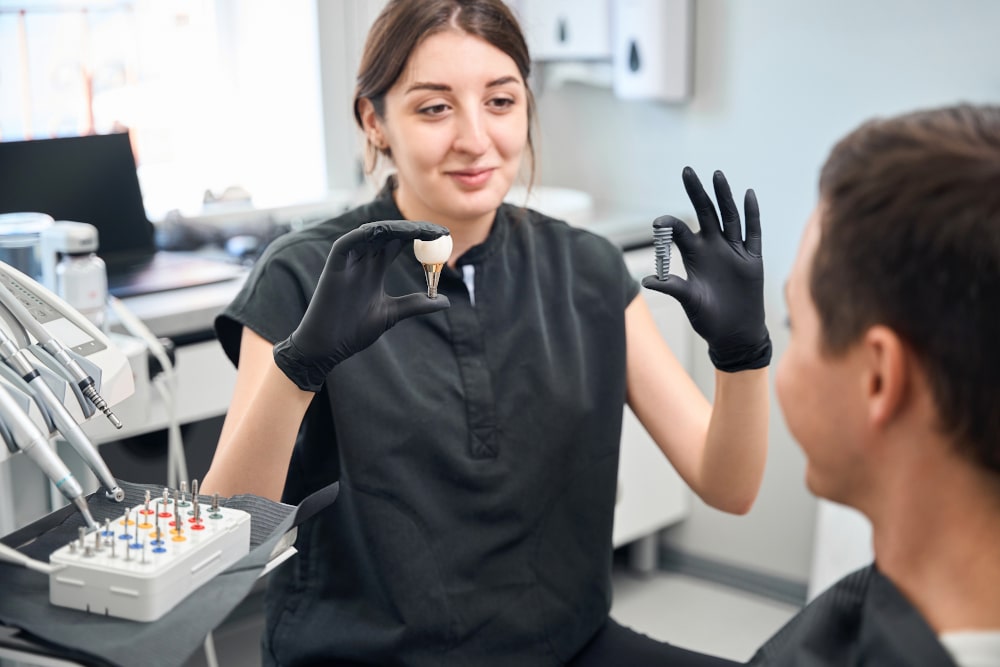
Key Takeaways
- Dental implants are not one-size-fits-all — different types exist for various needs, including endosteal, subperiosteal, and zygomatic implants.
- Endosteal implants are the most commonly used and generally offer the highest success rates when placed by qualified professionals.
- Choosing the right clinic is essential to long-term implant success. Factors like provider experience, available technology, transparent pricing, and patient reviews should guide your decision.
- Costs can vary significantly depending on the complexity of treatment, materials used, and clinic location. Always request a detailed treatment plan and quote in advance.
- Financing options are available at many clinics to make implant treatments more accessible through monthly payment plans.
- Do your research before committing — verify credentials, read real patient reviews, and don’t hesitate to get a second opinion.
- Technology matters — clinics using tools like 3D scanning and guided surgery tend to offer more precise and efficient care.
- Red flags to watch for include vague pricing, outdated equipment, lack of specialist credentials, and overly aggressive sales tactics.
What are the different types of dental implants available in Toronto?
Dental implants aren’t a one-size-fits-all solution. Depending on bone density, patient health, and budget, several implant options are available across Toronto. Let's break them down.
Endosteal Implants
This is the most commonly used type in Toronto clinics. These implants are surgically inserted into the jawbone and are typically made from titanium. They resemble small screws and serve as roots for artificial teeth.
Advantages:
- High success rate (over 95%)
- Long-lasting (often a lifetime with proper care)
- Suitable for most patients with sufficient jawbone
Limitations:
- Requires sufficient bone density
- The healing period can be several months.
According to the Canadian Dental Association (CDA), endosteal implants remain the gold standard due to their strong integration with the jawbone and predictable outcomes.
Subperiosteal Implants
Less common in Toronto but still available, these are placed under the gum but above the jawbone. A metal frame supports the implant post and sits on top of the bone.
When used:
- For patients lacking enough healthy jawbone
- When bone grafting is not an option
Limitations:
- Lower success rate compared to endosteal implants
- Not recommended for high-chewing-force areas (like molars)
Some clinics in the Greater Toronto Area (GTA) may still offer this option, but it's generally less preferred due to its older design and potential complications.
Zygomatic Implants
Zygomatic implants are far more complex and are rarely needed. Instead of anchoring into the jawbone, they are embedded in the cheekbone (zygoma). These are usually reserved for cases where there's severe jawbone loss.
Pros:
- Avoids the need for extensive bone grafting
- Can support immediate-load prosthetics
Cons:
- Very specialized and high-risk procedure
- Only offered by a limited number of Toronto clinics with maxillofacial expertise
Dr. Amir Guorgui BSC, DMD, MACSD notes, “Zygomatic implants have changed the landscape for patients previously deemed ineligible. However, they should only be performed by trained surgeons with zygomatic-specific training.”
Toronto-specific Availability and Trends
Based on recent surveys from the Ontario Dental Association and published clinical directories, here is a breakdown of implant type availability:
| Implant Type | Common in Toronto? | Avg. Cost (Single Tooth) | Success Rate | Best For |
|---|---|---|---|---|
| Endosteal | Very Common | $1,500–$2,500 | 95%+ | Most patients |
| Subperiosteal | Rarely Offered | $2,000–$3,500 | ~80% | Thin bone cases |
| Zygomatic | Limited Clinics | $4,000–$6,000 per implant | ~82% | Severe bone loss |
How do I choose the right dental implant clinic in Toronto?
When considering something as critical (and costly) as dental implants, your choice of clinic can make or break your long-term results. Let’s look at how to make a smart, well-informed decision.
Step 1: Check Credentials and Specializations
Ensure the clinic employs board-certified oral surgeons or periodontists. Clinics should prominently list their specialists and qualifications on their websites.
Things to look for:
- Certifications from the Royal College of Dentists of Canada
- Advanced training in implantology
- Membership in professional associations like the CDA or ICOI
Dr. James C.H. Ko DDS states, “Experience is everything. A clinic that completes hundreds of implants a year is more likely to spot issues early and provide better outcomes.”
Step 2: Read Reviews (and Where to Find Them)
Patient reviews can reveal a lot. Look beyond the clinic’s own website and dig into forums like Reddit, RateMDs, or Google Reviews.
Check for:
- Consistent praise for professionalism and hygiene
- Mentions of long-term success (1+ year follow-ups)
- How they handle complications or follow-ups
Step 3: Evaluate Technology Used
Modern technology often leads to better planning and fewer complications. Look for clinics that use:
- 3D CBCT scans
- Digital impressions (instead of traditional moulds)
- CAD/CAM prosthetic planning
These tools reduce the margin for error and improve implant fit and aesthetics.
Step 4: Assess Pricing Transparency and Financing Options
Transparent pricing and the ability to get a full cost estimate before treatment begins are essential.
Ask:
- Is the consultation free?
- Is the quote itemized?
- Are follow-ups included in the cost?
- Are there third-party financing partners?
Step 5: Consider Location and Accessibility
Toronto traffic is no joke. For procedures requiring multiple visits, a central or transit-accessible location (like downtown or along subway lines) makes life easier.
Red Flags to Watch For
- No before-and-after photos
- Vague pricing or pushy payment plans
- Lack of documented specialist credentials
- Too-good-to-be-true offers (e.g., "implants for $799!")

How much do dental implants cost in Toronto, and what affects the price?
Dental implants are a significant investment, and in Toronto, the range is broad. But it’s not just about numbers. What affects those numbers is equally important.
General Price Ranges
| Procedure Type | Avg. Price Range |
|---|---|
| Single Tooth Implant | $1,500–$2,500 |
| Implant + Crown | $3,000–$4,500 |
| Full Arch (All-on-4) | $15,000–$25,000+ |
| Bone Grafting (if needed) | $500–$2,000 |
All prices are in CAD and may vary by 10–20% depending on the clinic and materials used.
Key Price Factors
- Type of Implant
Zygomatic implants or customized abutments can dramatically increase the cost. - Surgeon Expertise
More experienced or highly trained surgeons may charge more, but often deliver better outcomes. - Location of Clinic
Clinics in downtown Toronto or high-end areas like Yorkville typically charge more due to overhead and market positioning. - Technology Used
Digital scanning, same-day crowns, or guided surgery tools often carry additional fees. - Full vs. Partial Treatment
Is it just the implant post, or does it include the crown, abutment, and follow-ups? Comprehensive packages are often more cost-effective long term.
Insurance and Financing
Most Canadian dental insurance plans do not cover dental implants unless they are deemed medically necessary. At Smile By Design in North York, patients have access to flexible financing options through trusted third-party providers like iFinance (Dentalcard). This allows you to split the cost of your dental implant treatment into convenient monthly payments, making it easier to manage your budget without delaying essential care.
For more information, you can visit the clinic’s financing page.
What questions should I ask at a dental implant consultation?
The consultation sets the tone for your entire treatment. It’s your best chance to get clarity, avoid surprises, and gauge the clinic’s professionalism. Here’s what to ask—organized step by step.
Step 1: Ask About the Procedure Itself
- What type of implant do you recommend for my case, and why?
- How many implants have you placed, and what’s your success rate?
- Will this be done in one stage or multiple stages?
Understanding the procedural plan helps you anticipate visits, recovery, and costs.
Step 2: Ask About Materials and Lab Work
- What material will the implant and crown be made from?
- Do you use a local dental lab or outsource?
- Is the abutment custom or standard?
Cheap materials and offshore labs can lower costs, but also quality. Look for transparency.
Step 3: Understand the Timeline
- How long will the entire process take from start to finish?
- Will I be without teeth during healing?
- Are there options for temporary prosthetics?
Timelines can vary depending on bone healing, grafts, and whether you need additional prep.
Step 4: Discuss Risks and Alternatives
- What are the risks of failure or complications?
- What’s your protocol if the implant fails?
- Are there any alternatives I should consider (like bridges or dentures)?
Step 5: Recovery and Maintenance
- What should I expect during recovery?
- Will there be swelling, bleeding, or pain?
- How do I maintain the implant long-term?
Proper post-op care affects longevity, so detailed aftercare plans matter.
Step 6: Financial and Legal Questions
- Can I get a complete, written treatment plan with costs?
- Are follow-up appointments included?
- Is there a warranty on the implant or crown?
Many reputable clinics offer limited warranties and ongoing maintenance plans.
What technology and equipment should a top dental implant clinic use?
The tools behind your treatment matter as much as the hands that use them. Here’s what distinguishes leading Toronto clinics from the rest.
CBCT (Cone Beam Computed Tomography) Scanning
CBCT offers a 3D view of the patient’s anatomy, essential for precise implant planning.
Why it matters:
- Avoids damaging nerves or sinus cavities
- Enables more accurate placement
- Helps evaluate bone density
Clinics like All On Four Dental Implants Toronto use CBCT as part of the standard protocol.
3D Treatment Planning Software
Top clinics simulate the entire procedure using digital models. It helps customize the approach before making any incisions.
Tools often used:
- BlueSky Plan
- Simplant
- NobelClinician
Guided Implant Surgery
Using digitally fabricated surgical guides, this method increases accuracy and reduces healing time.
Benefits:
- Minimally invasive
- Faster recovery
- Lower risk of error
In-House Dental Labs
Clinics with on-site labs can:
- Create crowns or bridges faster
- Adjust fittings on the spot
- Use premium materials with better quality control
In-house labs also reduce overall treatment time.
Digital Impressions
Say goodbye to the uncomfortable goo moulds. Digital scanners offer faster, more precise impressions.
Examples:
- iTero Element
- TRIOS by 3Shape

What’s the difference between a dental implant dentist and a general dentist?
Confused about who to trust with your implants? You’re not alone. The difference between a general dentist and a dental implant specialist can make all the difference in the outcome.
| Category | General Dentist | Dental Implant Specialist |
|---|---|---|
| Education | DDS or DMD | Additional 2–4 years (Periodontics, Oral Surgery) |
| Experience with Implants | Basic training or short courses | Hundreds to thousands of cases |
| Equipment Access | Varies | Usually advanced technology |
| Complexity Handled | Simple cases only | Full reconstructions, zygomatic cases |
| Ideal For | Simple single-tooth cases | Complex, multi-implant needs |
Misconceptions to Watch For:
- “All dentists can place implants.” Technically accurate, but skill varies wildly.
- “Cheaper is better.” Not when it comes to surgically integrating metal into bone.
When in doubt, ask: How many implants have you placed? What kinds of cases do you usually treat?
What are the warning signs of a poor-quality implant clinic?
Finding the right clinic means knowing what to avoid just as much as what to seek. Poor-quality implant clinics often leave behind a trail of red flags—some obvious, others subtle. Here's how to spot them.
Outdated Technology
A modern implant clinic should have current diagnostic and surgical tools. A lack of CBCT scanners, guided surgery tools, or digital impressions typically indicates outdated practices.
Red flags:
- No mention of technology on the clinic website
- Use of manual impressions instead of digital
- Absence of digital planning software
Lack of Transparency
Shady clinics often dodge detailed pricing and procedural explanations. If you can’t get a precise written quote, walk away.
Watch out for:
- “Prices start from…” but no upper range
- Pushy package deals with time-limited offers
- Refusal to provide itemized breakdowns
Many patients have reported aggressive upselling or hidden post-op fees. Transparency is non-negotiable.
Poor Online Reviews or Forum Feedback
Online feedback is one of the best vetting tools available. Consistently poor reviews are a huge red flag.
Sources to check:
- Google Reviews
- RateMDs
- Reddit Toronto
Common review complaints:
- Rushed appointments
- Poor bedside manner
- Implants that failed within 6–12 months
If you notice repeated themes like “they ghosted me after it failed” or “the crown didn’t fit,” take that seriously.
Unverified or Inexperienced Providers
If you can’t confirm a dentist’s specialty or experience with implants, that’s a problem. The Royal College of Dental Surgeons of Ontario (RCDSO) has a public registry of licensed professionals.
Other Signs of Trouble
- A dirty or outdated waiting room and equipment
- No clinical photos or case studies were shared
- A generic website with stock images instead of real results
- Unrealistic pricing (e.g., $699 per implant all-inclusive)

How can I verify a clinic’s reputation before booking?
Doing your homework before setting foot in a clinic can save you thousands of dollars—and years of frustration. Here are practical steps to check any dental implant clinic’s credibility.
Google and RateMDs Reviews
Start by reading both glowing and negative reviews. Look for trends and how the clinic responds to criticism.
What to look for:
- Are reviewers specific about the procedure?
- Is there a history of implant success?
- Do responses from the clinic sound respectful and informed?
A clinic with hundreds of reviews and a consistent 4.5+ rating likely performs at a high standard.
Use the RCDSO Directory
The Royal College of Dental Surgeons of Ontario licenses and regulates all dentists in the province. Their online registry confirms:
- Education and credentials
- Specializations (e.g., periodontist, prosthodontist)
- Disciplinary history (if any)
Verify here
Better Business Bureau (BBB) and Other Legal Listings
The BBB provides consumer complaints and how a business responded. It helps spot issues like billing disputes, fraud, or unfulfilled warranty promises.
Check also:
- BBB Toronto
- Ontario Health Professionals Database
Seek Patient Testimonials and Case Studies
Trustworthy clinics showcase their success. Look for:
- Before-and-after photo galleries
- Video testimonials with real patients
- Blog posts or case write-ups that explain complex cases
What’s the best way to find a trustworthy dental implant clinic in Toronto?
By now, it's clear: getting dental implants isn’t just about the procedure—it’s about who you trust to perform it. So what’s the best strategy for choosing?
What to Look For in a Top Toronto Implant Clinic
| Criteria | What to Expect |
|---|---|
| Specialist Credentials | Oral surgeon or periodontist with advanced training |
| Patient Reviews | 4.5+ star rating across 100+ reviews |
| Diagnostic Technology | CBCT, digital scans, treatment simulation |
| Transparent Pricing | Itemized quotes, no hidden fees |
| Case Studies/Testimonies | Real patient examples with images |
| Regulatory Verification | RCDSO, BBB, no complaints |
Expert Tips for Next Steps
- Ask the tough questions. A good clinic welcomes them.
- Verify everything. Don’t assume licensure or experience.
- Compare 2–3 clinics. Get second opinions before committing.
- Watch for sales tactics. Trust is built with clarity, not pressure.
Sources Used:
- Royal College of Dental Surgeons of Ontario: https://www.rcdso.org/en-ca
- Better Business Bureau: https://www.bbb.org/ca/on/toronto
- Reddit Toronto (/r/askTO): https://www.reddit.com/r/askTO/
- All On Four Dental Implants Toronto: https://allonfourdentalimplants.ca/
- Canadian Dental Association: https://www.cda-adc.ca/


